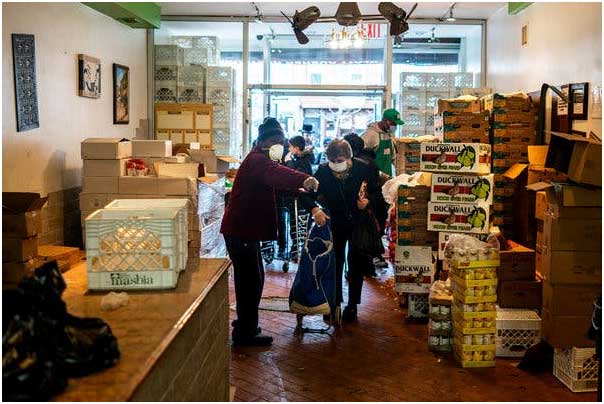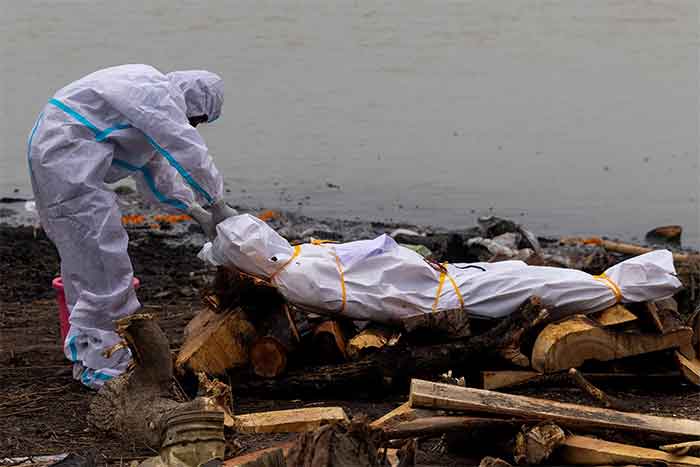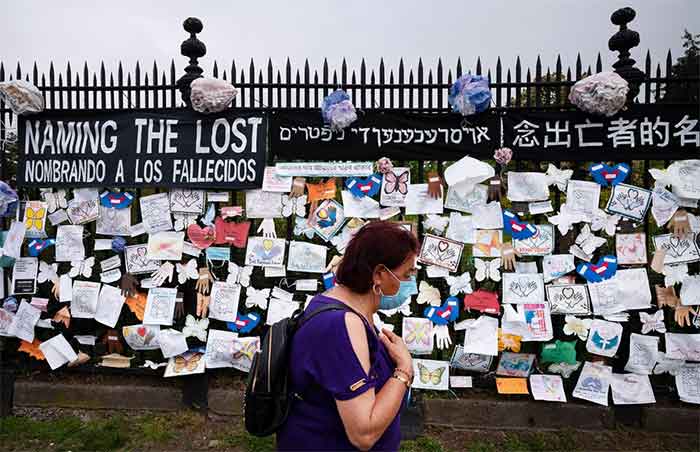
Anaheim, California: Cars were lined up about a half mile long in both directions of the 57 Freeway to get to Second Harvest Food Bank
On March 30, the-stay-at home order became Maryland law at 8 p.m. that night. Since then a common scene that most news media are carrying – from Atlanta to Pittsburgh, from Pennsylvania to Baltimore, people are queuing in lines or in their cars to pick up free groceries either from different designated food pantries or drive-through windows. It is astounding to see how little prepared people are during this coronavirus crisis. All these people are not the members who were in the government’s Food Stamp program or who are on Welfare. Many of them are middle-income families who are having a hard time feeding their families after losing their jobs because of the shutdown. Last night, it was shocking to hear that one my husband’s former colleague (a white-American woman) is going to her local Food Bank to get free groceries for her family. Before the pandemic, she had belonged to the upper-middle income group. But like most Americans, she probably did not care much about putting money in the savings account in case of emergencies. Otherwise, why someone who had a good income would rely on the assistance of others to feed herself with donated food? All this information she had revealed herself on her FB page after my husband put a post on FB about the Food Banks facing shortages of food and supplies.
But this is no normal time. No matter how you do not want to involve yourself, it is not possible to avoid all the sad news that is around you constantly. This is a new realism that most of us are trying to reckon with. As I am drafting this piece, I still simply cannot wrap my head around to the reality as to how someone who had a decent job only six weeks ago, now do not have food at home to put on the table. How are such families going to survive in the next few months? What about those people who had delayed finding out what sort of help is out there for them or what if the lockdown stays in place for months? There is no national hotline to find out as far as I know. As we are heading towards a pandemic summer in a few weeks, I am not too worried about my family’s food situation. As a culinary enthusiast, my food pantry is well-stocked year round since very often I try out new recipes from a series of seasonal cookbooks that I had accumulated over the years. After the shutdown and stay at home order was issued, I had made sure that the supply of staple food is sufficient to last for two to three months. But after hearing what the former office colleague is going through, I have started to re-think if I should simplify our daily supper menu and keep it very basic and hold onto to the reserve as much I can. From the onset of the pandemic, the hoarders have been justifying that sooner or later the supply chain will dwindle as more and more people will fall sick. Even after panic buying from the shoppers that cleared the supermarket shelves, so far these are getting restocked but not fully. The supply trucks are still coming in at irregular intervals.
In one of my articles, published in the Countercurrents a few weeks ago, I had mentioned that in case of severe food shortages in the coming months, if we run out of supplies, and given the fact that we simply cannot have groceries delivered because there are no delivery people, perhaps the National Guard will come to the rescue. That statement was said half-heartedly. Little did I know that my prediction will come true in two weeks’ time. The National Guard is already on the scenes across towns and communities in Washington State, Louisiana, and of course in New York handling food packages and distributing it to those who come to fetch. New York was one of the first states where National Guard was called in to help with food boxes and to ensure that the distribution per family runs smoothly. There are no definite criteria as to who qualifies for it. It is given on a first come first served basis. People line up and wait in lines for hours to get their share. In many other communities’ people go to the drive-through window in their luxury cars to grab a box or two. Those packages contain mainly basic food like pasta, bread, canned vegetables, pork & beans, canned tuna fish, and chicken noodle soup (a great cure for any type of virus ailment, and it is widely believed that the hot liquids helps the body’s ability to heal and ease symptoms). Sometimes the bags at the Food Banks do have some cleaning supplies, and laundry detergents.
Food Banks and nation’s food pantries were not designed to give food away to anyone who needs it. Such charitable organizations were never intended to handle a pandemic type situation or to oversee a crisis that is overwhelming the nation now. These programs were set up to supplement government’s Food Stamp programs for the low-income families, pregnant women, and for the disable who fall below the poverty line. They simply cannot meet the demands of the middle-class families who did not or were not able to prepare themselves before the coronavirus hit their communities. There is no denying that people are feeling the economic impact because of coronavirus as they are having a hard time to meet ends meet after the sudden loss of millions of jobs. Many are unable to file for unemployment after weeks of trying. Some people try to get through the phone line all day long. A Latina woman, who was a part-time sales associate at Sephora (a cosmetic company) in Texas, was laid off a month ago, along with other part-time and seasonal employees. In a recent interview with the New York Times she had revealed that most of her day now is spent in getting hold of an agent in the unemployment office but to no avail. The phone lines are always jammed. She now regards it as her full time job. She has less than few hundred dollars in her bank account. Others are not getting the unemployment benefits that were promised.
Amid all the sad stories, it is a surreal scene to see that men and women in their BMW SUVs waiting for hours in never ending lines of cars to receive food packages to feed their families. The lines are often four miles long. I have seen a footage a couple of days ago where hundreds of cars waiting in line to enter a food bank in Pittsburgh in the wee hours of the morning to wait for a 12 p.m. pick up. When they expect 200 cars, more than 600 are showing up. Some wait all night long to be the first in line when the pantry window opens in the morning.
The Food Banks are almost running on empty as the donations are not pouring in as before. They are overwhelmed by the demand and they do not have enough volunteers to fill in the boxes with supplies for an individual or a family. Only the brave ones out of concern that their fellow beings will have to go to sleep on an empty stomach – put up a brave face and show up to help out so that others can pick up free bags of food for their families. On April 11, RollingStone reported: “The Food Banks are overwhelmed and it’s Congress’ fault.” Who else to blame? The Congress did not expand the benefits to the underprivileged.
The food crisis in combination with lack of availability, and huge anxiety is adding to the stress level of people who are caught by surprise by the coronavirus. In all the designated food pantries where National Guards were not called in, uniformed guards from other law enforcement agencies are filling in to make sure that there are no altercations between the volunteers and the people who are stopping by all day long to try their luck in receiving a few basic supplies in order to survive. After waiting in a line for hours, when the supplies run out some are naturally upset, and a handful of people also thank the volunteers for their efforts in trying their best to direct them to another location where they might find some basic supplies. They simply run to their next destination.
Those residents who do not have to worry about where their next meal is coming from are stepping up in fulfilling their civic duties by donating money in supporting those in their communities who are impacted by the pandemic. As food donations from local grocery stores and corporate sponsors had a sharp decline in the last two months, Feeding America, a nonprofit task force has set up a COVID-19 Response Fund. It is seeking $2.6 million to tackle the immediate crisis and to help its 400 affiliates across the country to support the poor, elderly, vulnerable, disable, and the sick population who are affected by the coronavirus. The Washington Post reported that Feeding America had seen 64 percent decrease in donations. They are also coming up very short on volunteers as previously they had relied on retirees and senior citizens to give their time. Most of them are hunkered down at home as they belong to a vulnerable age group. Without able-bodied public and government funds, nonprofit organizations like Feeding America and Mother Jones simply cannot take care of the food-insecure households in America.

A food pantry in New York City
In this time of food shortage in American households, billionaire Jeff Bezos is also trying to bear some of the burdens by ensuring that the food distribution is not disproportionate in the communities where low-income and jobless families live. On April 2, Bezos announced that he is donating $100 million to Feeding America, which is serving as a clearinghouse to distribute money to food banks around the needy communities in the country. “The gift is the nonprofit’s largest-ever single donation, Bezos’s third-biggest commitment to date, and is tied for the single-largest coronavirus commitment to date from tech philanthropist.” “I’ve never seen anything like it,” said Stacy Dean, vice president for food assistance policy at the Center on Budget and Policy Priorities, a research organization in Washington DC. “People love the phrase ‘the perfect storm,’ she added, “but nothing is built for this.” She, of course, was referring to the food shortage in American homes in the recent weeks.
Zeenat Khan writes from Maryland, USA
SIGN UP FOR COUNTERCURRENTS DAILY NEWS LETTER














































